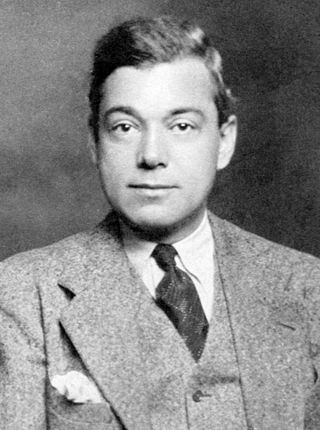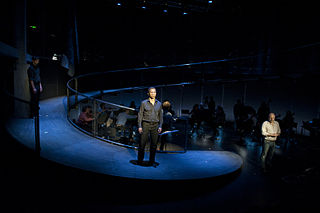Related Research Articles
Christopher Logue, CBE was an English poet associated with the British Poetry Revival, and a pacifist.
Charles Louis Mee Jr. is an American playwright, historian and author known for his collage-like style of playwriting, which makes use of radical reconstructions of found texts. He is also a Special Lecturer of theater at Columbia University.

George Jean Nathan was an American drama critic and magazine editor. He worked closely with H. L. Mencken, bringing the literary magazine The Smart Set to prominence as an editor, and co-founding and editing The American Mercury and The American Spectator.

Ethan Phillips is an American actor. He is best known for his television roles as Neelix on Star Trek: Voyager and PR man Pete Downey on Benson.
Defiant Theatre was a Chicago-based theatre company founded in 1993 by a group of students from the University of Illinois at Urbana-Champaign, which included Nick Offerman. The eclectic troupe specialized in productions that emphasized inventive stagecraft, perverse and controversial topics, and skillful stage combat. While the company is highly regarded for original plays such as Action Movie: The Play and Godbaby, Defiant Theatre received notable attention for productions of plays by Caryl Churchill, Alfred Jarry, Sarah Kane, and William Shakespeare. Chicago Magazine named Defiant the "Best Experimental Theatre" in their August 1999 Best of Chicago issue. The company disbanded in 2004.

Craig Lucas is an American playwright, screenwriter, theatre director, musical actor, and film director.

There are a wide range of ways in which people have represented the Trojan War in literature and the arts.
The Lark is a 1952 play about Joan of Arc by the French playwright Jean Anouilh.. It was first presented at the Théâtre Montparnasse, Paris in October 1953. Translated into English by Christopher Fry in 1955, it was then adapted by Lillian Hellman for the Broadway production in the same year.

Eric Salzman was an American composer, scholar, author, impresario, music critic, and record producer. He is known for advancing the concept of "New Music Theater" as an independent art form differing in scope, both economically and aesthetically, from grand opera and contemporary popular musicals. He co-founded the American Music Theater Festival and was, at the time of his death in 2017, Composer-in-Residence at the Center for Contemporary Opera.
Diedre Murray is an American cellist and composer specializing in jazz and musical theater. She also works as a record producer and curator.
Lillian Groag is an Argentine-American playwright, theater director, and actress. Her plays include The Ladies of the Camellias, The Magic Fire, and The White Rose.
Mel Shapiro is an American theatre director and writer, college professor, and author.
Matthew Earnest is an American theater director. He has also written plays, as well as adapted plays from novels, non-fiction books, short stories, and essays, and he has translated works in other languages for his direction.
Stephen Sachs is an American stage director and playwright. He is the co-artistic director of the Fountain Theatre in Los Angeles, which he co-founded in 1990.
Round Heads and Pointed Heads is an epic parable play written by the German dramatist Bertolt Brecht, in collaboration with Margarete Steffin, Emil Burri, Elisabeth Hauptmann, and the composer Hanns Eisler. The play's subtitle is Money Calls to Money and its authors describe it as "a tale of horror." The play is a satirical anti-Nazi parable about a fictitious country called Yahoo in which the rulers maintain their control by setting the people with round heads against those with pointed heads, thereby substituting racial relations for their antagonistic class relations. The play is composed of 11 scenes in prose and blank verse and 13 songs. Unlike another of Brecht's plays from this period, The Mother, Round Heads and Pointed Heads was addressed to a wide audience, Brecht suggested, and took account of "purely entertainment considerations." Brecht's notes on the play, written in 1936, contain the earliest theoretical application of his "defamiliarization" principle to his own "non-Aristotelian" drama.

Performance Network Theatre, founded in 1981, was Ann Arbor, Michigan's premiere professional Equity theatre. It produced a wide variety of dramas, classics, comedies, Pulitzer Prize and Tony award-winners, many of which were World or Michigan Premieres. Its professional season included five to seven main stage productions. Other programming included seasonal productions that ran in repertory over the holiday season, the Northern Writers' Project—a week-long playwriting intensive, children's programming, the Fireside Festival of New Plays, the Open Table Series, the Open Stage series, music and more.
Carey Elizabeth Perloff is an American theater director, playwright, author, and educator. She was the artistic director of American Conservatory Theater (A.C.T.) in San Francisco from 1992 to June 2018.

In the Penal Colony is a chamber opera in one act and 16 scenes composed by Philip Glass to an English-language libretto by Rudy Wurlitzer. The opera is based on Franz Kafka's German-language short story In the Penal Colony. It was commissioned by ACT Theatre in Seattle, Washington, where it premiered on August 31, 2000. It has a running time of approximately 80 minutes and is scored for two singers and a string quintet.
Laura Eason is an American playwright and screenwriter.
James Bundy is an American theatre director and teacher who has served as Dean of Yale School of Drama and Artistic Director of Yale Repertory Theatre since 2002.
References
- ↑ Sarah Crown’s review, The Guardian, 28 April 2016
- ↑ War Music 1981, p.vii
- ↑ D. J. R. Bruckner, "Hearing The Iliad with a co-creator's ears", New York Times, 12 June 2001
- ↑ Robert Hurwitt (22 March 2009). "Lillian Groag directs 'War Music' for ACT". San Francisco Chronicle.
- ↑ Nathan Currier site